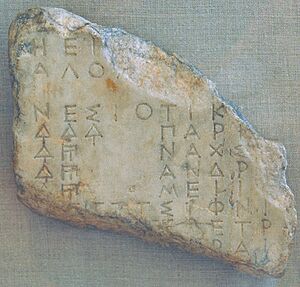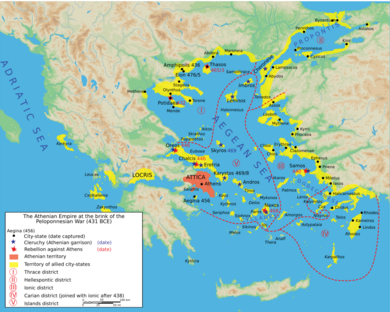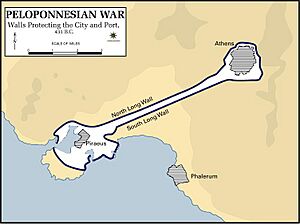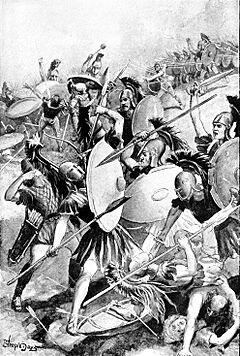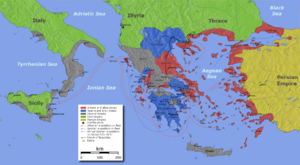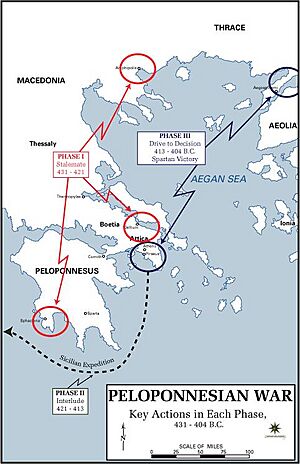Peloponnesian War facts for kids
Quick facts for kids Peloponnesian War |
|||||||||
|---|---|---|---|---|---|---|---|---|---|
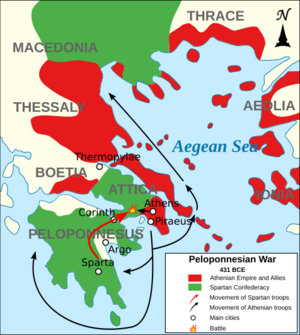 Alliances at 431 BC, with Delian League in red and Peloponnesian League in green |
|||||||||
|
|||||||||
| Belligerents | |||||||||
| Delian League (led by Athens) |
Peloponnesian League (led by Sparta) Supported by: Achaemenid Empire |
||||||||
| Commanders and leaders | |||||||||
| Pericles # Phormio Cleon † Nicias Alcibiades Demosthenes |
Archidamus II Brasidas † Gylippus Lysander Alcibiades |
||||||||
| Casualties and losses | |||||||||
| At least 18,070 soldiers unknown number of civilian casualties. |
Unknown | ||||||||
The Peloponnesian War was a huge conflict in ancient Greece. It lasted from 431 BC to 404 BC. This war was mainly fought between two powerful city-states: Athens and Sparta. Each city had many allies who joined their side. They were fighting to see who would be the most powerful in the Greek world. The war was very long and tough. It only ended when the Persian Empire stepped in to help Sparta. With Persian money, Sparta built a strong navy. This navy, led by Lysander, finally defeated Athens. After this, Sparta became the most powerful city in Greece for a while.
Historians usually divide this long war into three main parts.
The first part (431–421 BC) is called the Archidamian War. It's named after Archidamus II, the king of Sparta. During this time, Sparta and its allies, known as the Peloponnesian League, often invaded the land around Athens called Attica. They used their strong army of Hoplite soldiers. But Athens had huge defensive walls, called the Long Walls. These walls protected the city and its port, making Sparta's land attacks less effective. Meanwhile, Athens had a powerful navy, the Delian League. This navy attacked the coasts of Sparta's allies. This caused problems for Sparta.
A peace treaty, called the Peace of Nicias, was signed in 421 BC. It was supposed to last for 30 years. But this peace was shaky and only lasted about six years. During this time, some smaller battles still happened. One important battle was the Battle of Mantinea in 418 BC. Sparta won this battle against a group of cities allied with Athens.
A major turning point was the Sicilian Expedition (415–413 BC). Athens tried to conquer the city of Syracuse in Sicily, an ally of Sparta. This plan went terribly wrong. Athens lost almost its entire navy and many soldiers.
This huge loss led to the third and final part of the war (413–404 BC). This phase is sometimes called the Decelean War or the Ionian War. During this time, the Persian Empire started helping Sparta. Persia wanted to regain control over Greek cities in Asia Minor. With Persian money, Sparta built a very large fleet. This fleet was led by the skilled general Lysander. Lysander won many important naval battles. The most famous was the Battle of Aegospotami in 405 BC. Athens was completely defeated. The next year, Athens surrendered and lost its entire empire. Lysander then set up new governments in cities that used to be Athens' allies. In Athens, a group known as the Thirty Tyrants took power for a short time.
The Peloponnesian War completely changed the world of ancient Greece. Before the war, Athens was the strongest city-state. After the war, Athens was much weaker. Sparta became the most powerful city in Greece. The war was very expensive for everyone. Many parts of Greece became poor. Athens was badly damaged and never became as rich as it was before the war.
The war also changed how Greek society worked. Athens was a democracy, where citizens voted. Sparta was an oligarchy, ruled by a few powerful people. These two different ways of governing caused many conflicts. Each city supported its own type of government in other cities. This made wars more common. Warfare in Greece became much harsher. It was no longer just small, formal battles. Instead, it became a fight that affected everyone. The war caused great suffering, destroyed many areas, and ended what many call the golden age of Greece.
Contents
How We Know About the War
Most of what we know about the Peloponnesian War comes from a historian named Thucydides. He started writing his book, The History of the Peloponnesian War, as soon as the war began. He gathered information from people who were there and saw events himself. Thucydides was an Athenian general early in the war. Later, he was sent away from Athens. He then lived in Sparta's territory and continued to collect stories. Many historians believe Thucydides was fair to both sides. His book is very detailed, but it stops seven years before the war ended.
Another historian, Xenophon, continued the story. His book, Hellenica, picks up right where Thucydides left off. Xenophon was also from Athens. He fought as a soldier for Persia and Sparta. He wrote his history many years after the war. Some people think his account favors Sparta.
Other ancient writers like Diodorus Siculus and Plutarch also wrote about the war. They used older sources that are now lost. We also learn about the war from old inscriptions and archaeology. These help us understand what life was like during that time.
Why the War Started
The historian Thucydides said the war was unavoidable. Athens was growing very powerful, and Sparta became worried. For almost 50 years before the war, Athens had become a major force in the Mediterranean.
Athens' power grew from an alliance called the Delian League. This group of city-states formed after the Greco-Persian Wars to protect against Persia. Athens led this league and slowly turned it into an empire. Athens controlled most of Greece, except for Sparta and its allies. The cities in the Delian League had to pay tribute to Athens. This money helped Athens build a strong navy and amazing public buildings. But it also made many allied cities unhappy.
Sparta and its allies, known as the Peloponnesian states, started to feel tension with Athens. After the Persians left Greece, Sparta tried to stop Athens from rebuilding its city walls. Sparta knew that without walls, Athens would be easy to attack. Athens refused, and Sparta felt secretly upset.
Later, in 465 BC, a revolt of slaves called helots happened in Sparta. Sparta asked its allies, including Athens, for help. Athens sent soldiers, but Sparta sent them away. Sparta feared the Athenians might help the helots instead. This made Athens very angry, and they ended their alliance with Sparta.
In 459 BC, a smaller war, called the First Peloponnesian War, broke out. Athens fought against Sparta and its allies for about 15 years. Athens gained some land but eventually lost it. The war ended with the Thirty Years' Peace treaty in 446/5 BC. This treaty said that Athens and Sparta would respect each other's alliances.
Peace Breaks Down
The Thirty Years' Peace was first tested in 440 BC. Athens' ally, Samos, rebelled. Sparta thought about going to war with Athens, but its ally Corinth disagreed. So, Sparta did not intervene, and Athens put down the revolt.
The main events that led to the big war involved Athens and Corinth. Corinth fought a battle against its colony, Corcyra. Corcyra was a strong naval power and asked Athens for help. Athens made a defensive alliance with Corcyra. At the Battle of Sybota, Athenian ships helped Corcyra. This prevented Corinth from fully defeating Corcyra.
After this, Athens ordered Potidaea, a city that paid tribute to Athens but was a colony of Corinth, to tear down its walls. Athens also told Potidaea to send away Corinthian officials. Corinth encouraged Potidaea to rebel against Athens. During the Battle of Potidaea, Corinth secretly sent soldiers to help Potidaea. This was a direct violation of the Thirty Years' Peace.
Athens also placed trade restrictions on citizens of Megara in 433/2 BC. Megara was an ally of Sparta. These restrictions, called the Megarian decree, made it very hard for Megara to trade with Athens' rich empire. Some historians believe these sanctions were a major cause of the war.
Corinth asked Sparta to call a meeting of its allies in 432 BC. They wanted to complain about Athens. An Athenian group also attended. The Corinthians criticized Sparta for not acting sooner. Athens reminded Sparta of its military strength and warned against war. King Archidamus II of Sparta spoke against war. However, a majority of the Spartan assembly voted that Athens had broken the peace. This was basically a declaration of war.
The Archidamian War (431–421 BC)
The first ten years of the war are known as the Archidamian War. It is named after Sparta's king, Archidamus II. The first attack was by Thebes on the Athenian outpost at Plataea on April 4, 431 BC.
Sparta and its allies mostly had strong land armies. Athens had a powerful navy. This meant neither side could easily defeat the other in a single battle.
Sparta's plan was to invade the land around Athens. This meant Athenians could not farm their fields. But Athens had the Long Walls connecting the city to its port, Piraeus. This allowed Athens to get supplies by sea. Many people from the countryside moved inside the walls for safety. At the end of the first year, Pericles, a famous Athenian leader, gave a speech known as his Funeral Oration.
Spartan armies usually stayed in Attica for only a few weeks. Soldiers needed to go home for harvest. Also, Sparta had to keep its helot slaves under control.
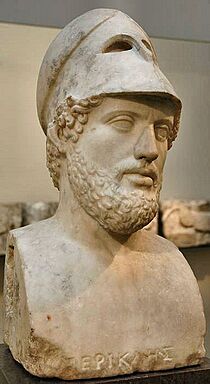
Athens' plan was guided by its general, Pericles. He told Athenians to avoid big land battles with Sparta's strong army. Instead, Athens used its navy to attack the Peloponnesian coast. In 430 BC, a terrible plague hit Athens. The disease spread quickly in the crowded city. It killed over 30,000 people, including Pericles and his sons. About one-third to two-thirds of Athens' population died. This greatly weakened Athens. The Spartans even stopped invading Attica because they feared catching the plague.
After Pericles died, Athenians became more aggressive. A new leader, Cleon, pushed for bolder attacks. General Demosthenes (not the later speaker) led successful naval raids. Athens also fortified new bases around the Peloponnese. One important base was near Pylos, on an island called Sphacteria. This base attracted runaway helots, which worried Sparta.
In 425 BC, Demosthenes trapped Spartan soldiers on Sphacteria. Cleon then led an attack and won a big victory at the Battle of Sphacteria. About 300 Spartan hoplites surrendered, which was a huge shock. It damaged Sparta's image of being unbeatable. Athens held these Spartans hostage. They threatened to execute them if Sparta invaded Attica again.
Later, the Spartan general Brasidas led an army to Amphipolis in Thrace. Amphipolis had silver mines that funded Athens' war efforts. An Athenian force, led by Thucydides (the historian), arrived too late. Brasidas captured Amphipolis. Thucydides was exiled for this failure. This allowed him to talk to people from both sides, which helped him write his history. Both Brasidas and Cleon were killed trying to retake Amphipolis. Sparta and Athens then agreed to exchange prisoners and signed a truce.
Peace of Nicias (421 BC)
With Cleon and Brasidas gone, the Peace of Nicias was signed in 421 BC. It was supposed to bring lasting peace. However, small fights continued in the Peloponnese. Some of Sparta's allies wanted to rebel. They were supported by Argos, a powerful city not allied with Sparta. With Athenian help, Argos formed an alliance of democratic cities.
Sparta tried to break up this new alliance but failed. The Argives and their allies, with a small Athenian force led by Alcibiades, tried to capture Tegea.
The Battle of Mantinea was the largest land battle in Greece during the war. Sparta and its allies fought against Argos, Athens, and their allies. Sparta won a complete victory. This saved Sparta from a difficult situation. The democratic alliance broke apart, and many cities rejoined Sparta's league. Sparta's power in the Peloponnese was restored.
In 416 BC, Athens attacked the neutral island of Melos. Athens demanded that Melos join their side against Sparta. The Melians refused. Athens then besieged their city. After Melos fell, the Athenians killed all the adult men. They sold the women and children into slavery.
The Sicilian Expedition (415–413 BC)
In the 17th year of the war, Athens heard that an ally in Sicily was under attack. The main city in Sicily was Syracuse, an ally of Sparta.
Athenians felt they should help their ally. They also dreamed of conquering all of Sicily. This idea was strongly supported by Alcibiades, who became a leader of the expedition. Syracuse was a large city, and conquering Sicily would give Athens huge resources. Before the fleet left, some religious statues in Athens were damaged. Alcibiades was accused of disrespecting the gods. He wanted a trial right away, but Athens let him go on the expedition. Many believed this was so they could plot against him later.
After arriving in Sicily, Alcibiades was called back to Athens for trial. Fearing he would be wrongly punished, Alcibiades fled to Sparta. Nicias was then put in charge of the mission. Alcibiades told the Spartans that Athens planned to use Sicily to conquer Italy and Carthage. Then, they would use those new resources to conquer the Peloponnese.
The Athenian force had over 100 ships and about 5,000 soldiers. They had few cavalry, which was a problem against Syracuse's strong cavalry. When they landed in Sicily, some cities joined Athens. But Nicias delayed attacking Syracuse. The campaigning season of 415 BC ended with Syracuse mostly unharmed. The Athenians spent the winter gathering allies. This delay allowed Syracuse to ask Sparta for help. Sparta sent its general Gylippus with reinforcements. Gylippus took command of the Syracusan troops. He defeated the Athenians in several battles and stopped them from invading the city.
Nicias asked Athens for more soldiers and ships. Demosthenes led another fleet to Sicily and joined Nicias. More battles followed, and the Syracusans again defeated the Athenians. Demosthenes wanted to retreat to Athens, but Nicias refused. After more losses, Nicias seemed to agree to retreat. But a bad omen, a lunar eclipse, delayed them. This delay was very costly. It forced the Athenians into a major sea battle in the Great Harbor of Syracuse. The Athenians were completely defeated. Nicias and Demosthenes tried to march their remaining forces inland. But the Syracusan cavalry attacked them without mercy. Almost the entire Athenian army was killed or sold into slavery.
The Final War (413–404 BC)
Sparta was not content with just helping in Sicily. They decided to take the war directly to Athens. Following Alcibiades' advice, they fortified Decelea, a town near Athens. This stopped Athens from using its land year-round. All supplies had to come by sea, which was more expensive. Also, the nearby silver mines were shut down. About 20,000 Athenian slaves were freed by the Spartans at Decelea. Athens' money ran low. They had to demand more tribute from their allies, which caused more tension.
Corinth, Sparta, and other Peloponnesian allies sent more help to Syracuse. They wanted to drive off the Athenians. But Athens sent another hundred ships and 5,000 troops to Sicily. Under Gylippus, the Syracusans defeated the Athenians on land. Gylippus also encouraged Syracuse to build a navy. This new navy defeated the Athenian fleet when they tried to leave. The Athenian army tried to retreat by land but was divided and defeated. The entire Athenian fleet was destroyed. Almost the entire Athenian army was sold into slavery.
After this huge defeat in Sicily, many believed the Athenian Empire was finished. Athens had little money, few ships, and many young men were dead or imprisoned.
Athens Fights Back
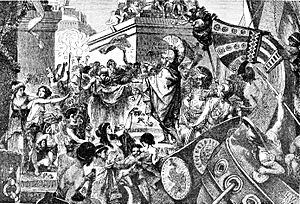
After the disaster in Sicily, Sparta encouraged Athens' allies to rebel. Many cities in Ionia did revolt. Syracuse sent its fleet to help the Peloponnesians. The Persians also decided to support Sparta with money and ships. Athens itself faced internal problems and the threat of rebellion.
However, Athens managed to survive for several reasons. First, their enemies were slow to act. Corinth and Syracuse were slow to send their fleets to the Aegean Sea. Sparta's other allies were also slow to provide troops or ships. Many Ionian cities that rebelled rejoined Athens when they did not get protection. The Persians were also slow to send the money and ships they promised.
At the start of the war, Athens had wisely saved some money and 100 ships. These were only to be used as a last resort. These ships were now released and became the core of Athens' fleet for the rest of the war. A group of 400 wealthy Athenians took power in Athens for a short time. Peace with Sparta might have been possible then. But the Athenian fleet, based on the island of Samos, refused this change. In 411 BC, this fleet fought the Spartans at the Battle of Syme. The fleet chose Alcibiades as their leader. They continued the war in Athens' name. Their opposition led to the return of a democratic government in Athens within two years.
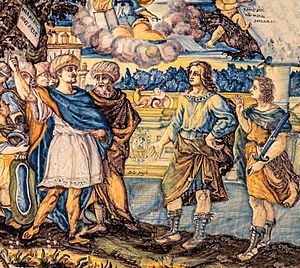
Alcibiades, even though he had been called a traitor, still had influence in Athens. He stopped the Athenian fleet from attacking Athens directly. Instead, he helped restore democracy through other means. He also convinced the Athenian fleet to attack the Spartans at the battle of Cyzicus in 410 BC. In this battle, the Athenians completely destroyed the Spartan fleet. They also managed to rebuild Athens' financial strength.
Between 410 and 406 BC, Athens won many victories. They slowly regained large parts of their empire. Much of this success was thanks to Alcibiades.
Persia Helps Sparta (414–404 BC)
From 414 BC, Darius II, the ruler of the Achaemenid Empire, became concerned about Athens' growing power in the Aegean Sea. He ordered his governor, Tissaphernes, to make an alliance with Sparta against Athens. In 412 BC, this led to Persia taking back most of Ionia. Tissaphernes also helped pay for the Peloponnesian fleet.
As Athens became stronger again, Darius II decided to give even more support to Sparta from 408 BC. He sent his son, Cyrus the Younger, to Asia Minor. Cyrus was made governor and commander of the Persian troops there. Cyrus allied with the Spartan general Lysander. Cyrus wanted Lysander's help to become king of Persia. Lysander, in turn, hoped to rule Greece with the help of the Persian prince. So, Cyrus gave Lysander all the money he needed for the Peloponnesian War. When Cyrus was called back to Persia by his dying father, he gave Lysander all the income from his cities in Asia Minor.
Cyrus the Younger later received help from the Spartans. He asked them to be as good friends to him as he had been to them. This happened when he led his own army to Persia in 401 BC to try and overthrow his brother, Artaxerxes II.
Athens' Final Defeat
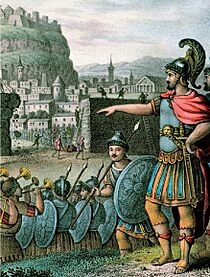
A group in Athens that disliked Alcibiades gained power after a small Spartan victory. This happened at the naval battle of Notium in 406 BC, led by the skilled general Lysander. Alcibiades was not re-elected as a general and left Athens. He never led Athenians in battle again. Athens did win the naval battle of Arginusae. The Spartan fleet lost 70 ships, and Athens lost 25. But bad weather prevented Athenians from rescuing their stranded crews. This failure caused great anger in Athens. Six of Athens' top naval commanders were put on trial and executed. Athens' navy was now weaker without these leaders and with low morale.
The new Spartan general, Lysander, was very good at naval strategy. He was also a clever diplomat. He had a good relationship with the Persian prince Cyrus the Younger. Lysander quickly sailed his fleet to the Dardanelles. This area was where Athens got most of its grain. Facing starvation, the Athenian fleet had to follow. Lysander used a clever strategy to completely defeat the Athenian fleet in 405 BC. This happened at the Battle of Aegospotami, where 168 Athenian ships were destroyed. Only 12 Athenian ships escaped. Some of these sailed to Cyprus, carrying the general Conon. He did not want to face judgment from the Athenian assembly.
Athens faced starvation and disease from a long siege. The city surrendered on April 25, 404 BC. Its allies soon surrendered too. The democrats in Samos, who remained loyal, held out a little longer. They were allowed to leave with their lives. Athens lost its walls, its fleet, and all its overseas lands. Corinth and Thebes wanted Athens to be destroyed and its citizens enslaved. But the Spartans refused. They said Athens had helped Greece in a time of great danger. Sparta then brought Athens into its own alliance system. Athens had to have the same friends and enemies as Sparta.
What Happened After the War
The Peloponnesian War changed Greece greatly. The Athenian Empire was replaced by a Spartan empire. After the battle of Aegospotami, Sparta took over Athens' empire. Sparta kept all the tribute money for itself. Sparta's allies, who had fought hard, received nothing.
For a short time, Athens was ruled by the Thirty Tyrants. This was a harsh government set up by Sparta. In 403 BC, these rulers were overthrown. A democracy was restored by Thrasybulus.
Even though Athens' power was broken, the city regained its independence in the Corinthian War. Athens continued to be important in Greek politics. Sparta was later defeated by Thebes at the Battle of Leuctra in 371 BC. A few decades later, the rivalry between Athens and Sparta ended. Macedonia became the strongest power in Greece. Philip II of Macedon united almost all of the Greek world. Sparta was later conquered by Philip's son, Alexander the Great, in 331 BC.
A symbolic peace treaty was signed by the mayors of modern Athens and Sparta on March 12, 1996. This was more than 2,500 years after the war ended.
Related Pages
Important Writers
- Plutarch
- Thucydides, who wrote History of the Peloponnesian War
- Aristophanes, who wrote the play "Lysistrata"
Images for kids
-
"Eight bookes of the Peloponnesian Warre written by Thucydides the sonne of Olorus. Interpreted with faith and diligence immediately out of the Greeke by Thomas Hobbes secretary to ye late Earle of Deuonshire" (Houghton Library).
 | George Robert Carruthers |
 | Patricia Bath |
 | Jan Ernst Matzeliger |
 | Alexander Miles |


